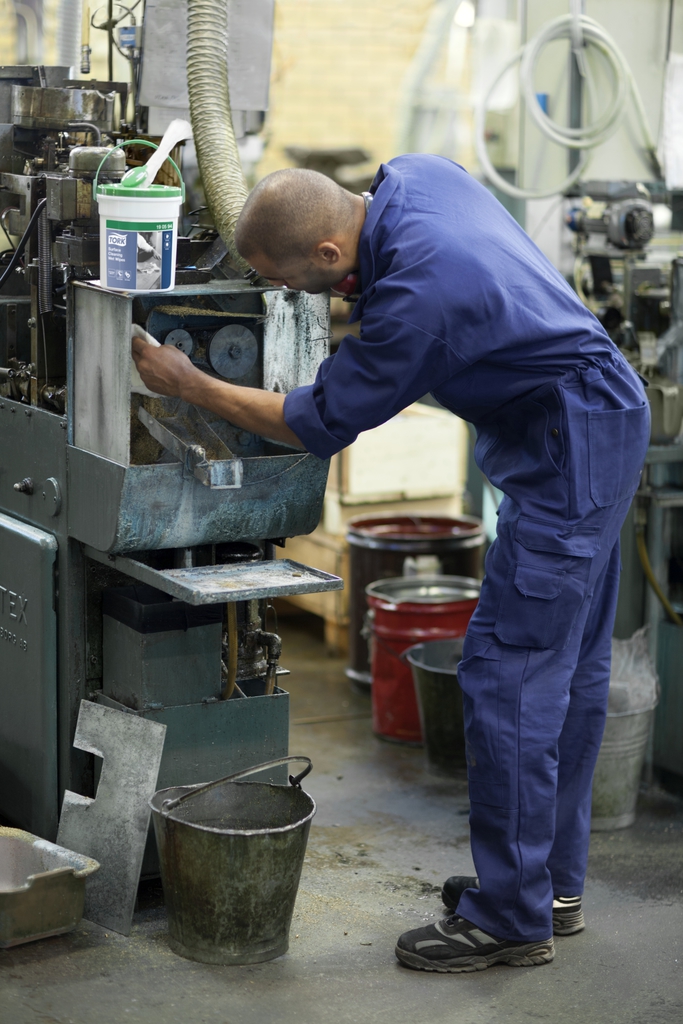The whole point of cleaning is to remove any soiling or contamination from an environment.
So it may seem a contradiction in terms to talk about cleaning as "a risky business".
However, industrial workers – and those who clean up after them – are constantly coming into contact with hazardous materials and may also encounter slip hazards on a regular basis. So any cleaning regime in an industrial environment needs to address these issues.
The type of substances that may require removal in an industrial setting could include paint, tar, oil, grease and silica dust. Heavy-duty dirt will require tough products to remove it – and some of these carry their own risks.
Solvents, for example, have traditionally been used to remove tough dirt and paint from surfaces and components. But these have been linked to a number of health and safety concerns including eye irritation, dermatitis, and headaches.
Textile rags were once the traditional tool for wiping surfaces and components. But once soaked in solvents, these too can become a health hazard since they will quickly pollute the atmosphere if they are left lying around the workplace.
A heavy-duty, non-woven disposable cloth is a good alternative. Some products on the market have been specifically designed for use with solvents, soaking them up effectively and releasing them efficiently back on to the wiping surface. This reduces the amount of solvent required to carry out each task and also kept on site, while the fact that the cloth is thrown away after use means the risk of solvent-soaked cloths polluting the workplace is eliminated.
Slips and trips are the most common cause of major injuries at work. Besides the human suffering they cause they are also estimated to cost industry more than £500 million a year.
Almost all slips occur when a floor is wet or dirty – and where cleaning takes place using a bucket of detergent there is an increased risk of spills. Chemical dosing systems that dispense cleaning fluids in measured quantities can greatly help to improve safety, but sometimes on-the-spot cleaning is more appropriate.
The use of impregnated wipes can greatly help to improve workplace safety since these remove the need for using "neat” liquid chemicals. Some manufacturers now offer "wet wipes” housed in a sealed bucket to avoid the potential hazard of using an open bucket of cleaning fluid.
In a food processing plant it is important that any cleaning task removes the risk of cross-contamination. Colour-coding is a simple yet highly effective method of avoiding cross-contamination. When different coloured buckets and cloths are used for specific tasks, staff training becomes very simple and employees quickly come to associate the correct colour cloth with the appropriate task.
Another risk to industrial workers and cleaners comes from constantly being in contact with substances that aggravate the skin. Detergents, solvents, oils and even prolonged or frequent contact with water can cause occupational dermatitis, and people in high-risk group include cleaners, construction workers and operatives using metalworking fluids.
The advice from the Health and Safety Executive to occupational dermatitis sufferers is to avoid contact with the offending substance wherever possible; to protect the hands with gloves and to wash the hands thoroughly and then dry them with a paper towel after contact with any potentially hazardous substance. Industrial washrooms should therefore be kept well stocked with effective hand cleansing products and user-friendly paper towels.
Silica dust – produced from concrete, cement, granite, masonry and brick – is another potential health hazard in industry and therefore needs to be removed quickly and safely from the workplace. Sweeping up silica dust with a broom simply moves the problem from one place to another, so a professional vacuum extraction system using a HEPA (High Efficiency Particulate Air) filter will help to alleviate the risks.
In a manufacturing environment, certain sensible health and safety precautions should be taken wherever strong chemicals are in use. Containers should be kept tightly sealed to avoid any evaporation into the air, and solvent-contaminated waste should be stored in sealed containers.
Workers should be provided with protective clothing where appropriate such as gloves, aprons, goggles or respiratory protection. Premises should be adequately ventilated during cleaning tasks and appropriate equipment such as tough cleaning cloths; pre-moistened wipers, colour-coded cloths and hand washing and drying products should be provided. In this way, industrial staff will be kept safe from most of the common health hazards in the workplace.
Stephen Belcher is a product manager for Tork manufacturer SCA.



